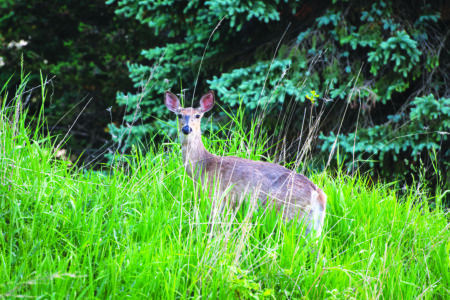The Japanese Barberry is just one example of an invasive species
PlayCleanGo Awareness Week

Photo michigan.gov., courtesy of Leslie J. Mehrhoff, University of Connecticut, Bugwood.org.
HOUGHTON — The Michigan Invasive Species Program (MISP) is joining the North American Invasive Species Management Association to promote PlayCleanGo Awareness Week, taking place today through June 14.
The annual event aims to educate outdoor enthusiasts on the importance of stopping the spread of invasive species while enjoying the great outdoors.
“Nearly 50% of endangered or threatened fish, wildlife and plants are at risk due to invasive species, which people unintentionally spread with their boots, tires, boats, firewood, pets and more,” said Joanne Foreman, Invasive Species Program communications specialist with the Michigan Department of Natural Resources, in a Thursday release from the MISP, “But the good news is, by taking a few easy steps, everyone spending time in nature can be part of the solution.”
Adopting “PlayCleanGo” can help prevent the spread of invasive species on land and in the water, the release says. The release explains how PlayCleanGo works:
PLAY: Yes, play! Swim, hike, fish, ride, dance under the stars – have fun!
• CLEAN: Before you leave the trail, campground or shore, shake it out, brush it off, wipe it down or whatever it takes to remove dirt and debris from your shoes, gear and vehicle. If you have a watercraft, remember to drain tanks and bilges, too!
• GO: Head out on your next adventure, invasive species-free!
“Whether your plans include off-road vehicle riding, hiking, or climbing,” Foreman said in the release, “helpful tips tailored to your favorite outdoor pursuits can be found at playcleango.org/take-action/.”
Any outdoor enthusiast can participate in PlayCleanGo, Foreman said in the release.
You can practice why fishing, ORVing, or enjoying theThe Free weekend, this Saturday and Sunday, June 7-8,the release states.
“It’s two full days when Michigan residents and out-of-state visitors can grab a fishing rod, ride the off-road trails and visit state parks, boating access sites and other outdoor locations — all free of charge.”
The start of the summer season is a great time to add PlayCleanGo to your recreation routine, Foremand added.
“Pack a boot brush or scrub brush in your vehicle so you can easily clean shoes before you move on. Make it a habit to check clothes and gear before leaving a recreation area and wash your bike or ORV before the next trip. If you’re hitting the water, clean, drain and dry your watercraft and fishing equipment to stop aquatic hitchhikers!”
The Keweenaw National Historical Park website, Invading Invasives – Lesson Plan, states invasive species are non-native plants and animals that have been introduced to an ecosystem, intentionally or not.
“Sea lamprey are parasites, which means they prey on other fish,” KNHP states. “As an invasive species, sea lamprey don’t have any natural predators and therefore they were free to prey on native fish species without any worry of being eaten themselves.”
Michigan Tech’s Keweenaw Invasive Species Management Area (KISMA) cites the Japanese barberry and other invasive species. Commonly sold as a landscaping shrub, they spread from gardens, causing infestations in local forests and providing an ideal habitat for ticks, KISMA says.
It is also listed on the Michigan Invasive Species website. The Japanese barberry, the website says, tolerates a wide range of soils and moisture conditions and can thrive in sun or shade. It is often found in forests, pastures and old fields and along woodland edges, roadsides and disturbed areas.






